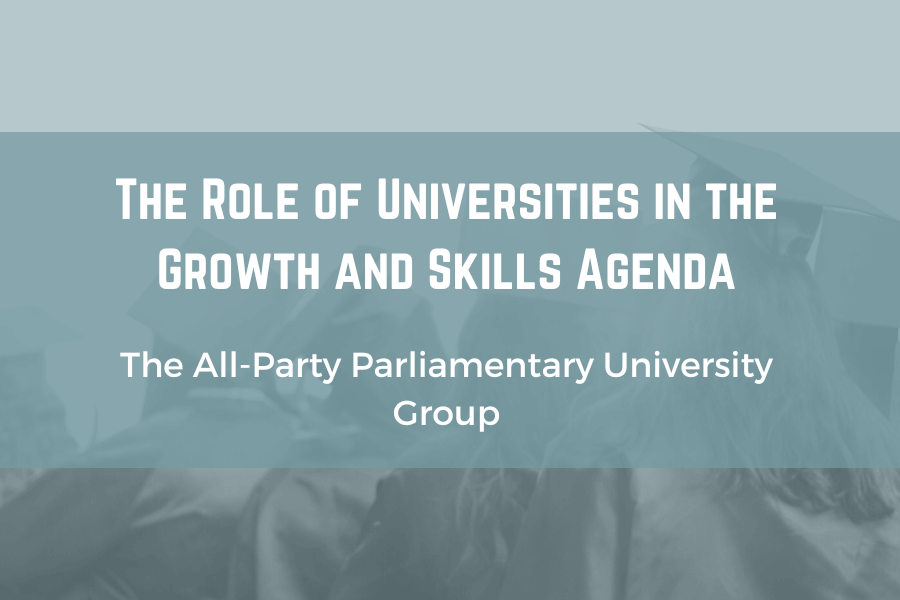Tom Lewis from Univerisities UK reports on the recent University Group APPG on 29th November, where they discussed the role of Universities in the growth and skills agenda. The All-Party Parliamentary University Group (APPUG) acts as a key avenue of communication between parliamentarians and vice-chancellors of the UK’s universities, providing an opportunity to examine issues affecting the country’s university sector and possible policy responses. This article was first posted on the All-Party Parliamentary University Group website.
The Chair of the All-Party Parliamentary University Group (APPUG), Daniel Zeichner MP, opened the discussion by providing some context of the economic contribution of universities, referring to the sector as one of the “UK’s success stories.”
Creating the conditions for universities to thrive
In his opening remarks, Rajay Naik, CEO of Skilled Education and Chair of the UK Commission on Lifelong Learning, celebrated the long-standing work of the APPUG, describing it as a “thoughtful, data-driven, and positive” group. His presentation provided an overview of the context and outlined three proposals for government to enable universities to maximize their potential.
On context, he described universities as “cathedrals of learning”, large employers, trusted establishments, and the creators of new businesses and entrepreneurs. Rajay referred to data commissioned by Universities UK that found 21,700 new companies and charities would be directly created as a result of universities in the next five years. He described a “huge skills crisis” and noted the shift towards a high-skill economy. He particularly highlighted skills in the health sector with 500,000 health professionals trained by universities before 2025. Degree-level apprenticeships were described by Rajay as an “incredible force for good” and he referenced the collaboration between the University of Exeter and JP Morgan. Rajay highlighted the 21% increase in demand for degree apprenticeships from last year and explained that a large amount of this growth was driven by new fields such as artificial intelligence and green-tech industries.
To create conditions for universities to thrive, Rajay called for the government to (1) provide certainty, (2) foster a credit transfer system, and (3) expand the help-to-grow programme.
On the topic of certainty, he referenced the recent noise over international student recruitment as well as solving the undergraduate fee level problem.
Rajay described the current system as “locked” with students unable to exercise agency in their choices. He called for students to take ownership of their education and tailor it to their requirements. He cited his work as Chair of the Lifelong Learning Commission which called for the devolving of budgets to empower individuals. Comparing lifelong learning to an ISA account, Rajay wanted lifelong learning investment to be seen like planned investment in personal finances.
Rajay celebrated the success of the Help to Grow programme with 51 UK university partners. The programme intends to up-skill adult education through partnerships with industry and would be upskilling 30,000 business leaders in the next few years. Rajay noted that Skilled Education were driving the online aspects of the programme and welcomed the government’s decision to increase eligibility. He described universities as “beacons” in their communities with a significant impact on regional economies through this programme.

Supercharging university engagement
Ceri Nursaw, CEO of the National Centre for Entrepreneurship in Education (NCEE), opened her presentation by considering the Lambert Review, published in 2003, which discussed university-industry partnerships. She also briefly outlined the history of NCEE, which was founded by the government 20 years ago, and was now “funded by the sector for the sector”. She celebrated the progress across the 20 years and highlighted that 90% of universities were embedding entrepreneurship in their degree programmes.
She proceeded to evaluate the success of the UK in international comparative terms including China where every university is mandated to give 30 hours of entrepreneurship training. Ceri noted that the UK could not be complacent given most of the jobs of the future were not yet created. Agility was required to meet these needs and entrepreneurial skills would be central to this.
Ceri called for three areas that the university sector and government needed to focus on to ensure the UK was at the forefront: (1) engagement of all students (2) supercharging the contribution of universities to communities, and (3) maintaining laser-sharp focus.
In discussing how to engage all, Ceri noted that the enterprise and entrepreneurial aspect was not mandated in degree courses. Her view, shaped by a background in social mobility, was that students from disadvantaged backgrounds disproportionately proceeded with safe choices after graduation rather than entrepreneurial pathways. Embedding an entrepreneurship component across all subjects including humanities and medicine would address this inequality.
On supercharging the value of universities in contributing to their local economy, Ceri described how most universities grew out of their cities. She said that universities faced challenges following the reduction in funding. Ceri cited the loss of EU funding and the uncertainty of international student recruitment to subsidise this activity. She said reduced funding would have knock-on consequences for university engagement with communities. Ceri welcomed the proposals from Universities UK for enterprise zones in universities that would be centred in areas targeted for levelling up.
On laser-sharp focus, Ceri reiterated the importance of championing enterprise and entrepreneurship. She shared her concern over the reductions in senior university staff with enterprise and entrepreneurship within their brief as well as staff CPD in this area. Ceri said this trend ran counter to the increased demand for these skills.
University contributions to growth and inclusive growth
Professor Simon Collinson, Deputy Pro-Vice-Chancellor for Regional Engagement at the University of Birmingham & Director of City-REDI / West Midlands Regional Economic Development Institute (WMREDI), began his presentation by noting the difficulties in measuring skills and growth and highlighted the importance of evaluating the effectiveness of interventions. Simon said centralised interventions were successful to a point, but regional devolved interventions were required too. He cited the trade-offs between productivity, inclusivity, and net-zero, with policymakers looking to make precise interventions.
His presentation considered (1) context, (2) how universities contributed to growth, (3) inclusive growth, and (4) recommendations.
Regarding context, Simon noted the importance of agreed terminology (i.e., “levelling up”) and echoed previous panellists’ remarks on stability. He said the government must maintain investment to the same degree as its OECD counterparts and focus on place-based interventions.
On the contribution of universities to economic growth, Simon noted his research into procurement, employment, and employment multipliers. Focusing on R&D and knowledge exchange, Simon cited research conducted by London Economics which found that the University of Oxford created £15.7 billion annually in economic growth. 50% of the economic impact was R&D and knowledge exchange. He noted the importance of innovation catapults or accelerators which are fixed intermediaries, helping bridge university R&D and the needs of local firms. These are important relative to spin-outs and start-ups which are often not locked into regions.
In discussing inclusive growth, Simon said upskilling was “front and centre”. He outlined how upskilling increases firm level profitability, increases resilience in households and businesses. On procurement, he said switching the same expenditure to certain firms such as those championing upskilling would have an immediate impact on innovation.
Simon noted the need to increase the precision of interventions in discussing recommendations to government. He said we needed to recognise that places vary significantly, and called for a greater understanding of the challenges, opportunities, and how to enable local coalitions. Simon also outlined the need to better understand the trade-offs that existed between productivity, inclusivity, and net zero. Alignment needed to be improved between the specialisms of universities and the needs of local firms. Finally, Simon advocated for more place-based funding from UKRI with built-in incentives to encourage local coalitions of universities, firms and public sector organisations to work towards inclusive growth.
Challenges for the sector
In his presentation, Matt Western MP, Shadow Higher Education Minister, outlined (1) the economic context, (2) challenges facing the higher education sector, and (3) a broad overview of Labour thinking.
Matt referred to the “tough economic position” in the UK with average annual growth forecast to be 1.4%. On utilising the potential of universities to generate growth, he used a football metaphor, noting that the best players (i.e., universities) had been left on the bench in recent years by government policy. He echoed previous remarks on the need for stability and said this was important for understanding the framework for universities to operate in and to forge relationships. On positives, he welcomed the Lifelong Learning Entitlement as well as the increased spending on schools which had repercussions for higher education.
On challenges for higher education, he said universities were “global operators” that faced global challenges. In addition to these challenges, Matt noted the skills deficit and national productivity that lagged behind its European counterparts.
In discussing the direction of Labour policy, Matt celebrated the progress of universities including their impact on communities and noted the damaging rhetoric of recent years. Referencing Keir Starmer’s CBI address Matt pointed to priorities on (i) economic stability, (ii) upskilling, and (iii) green growth. Matt said that Labour would develop a new modern industrial strategy including the Industry Strategy Council which would have statutory funding and operate independently of government. He noted the reform of the apprenticeship levy to become the growth and skills levy to enable greater flexibility to skills. On green growth, Matt said universities can be at the centre of innovation and expertise in this field. He cited the example of Yasa, a spin-out from a PhD project, which was bought out by Mercedes Benz and now employs 370 staff. Finally, on Horizon Europe, he reiterated the importance of association.
This article was written by Tom Lewis, Political Affairs Assistant, Universities UK.
Disclaimer:
The views expressed in this analysis post are those of the authors and not necessarily those of City-REDI / WMREDI or the University of Birmingham.


